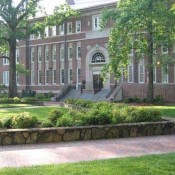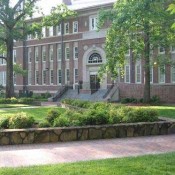Registration is now open for those wishing to attend the workshop Pots, Pepper, Charcoal, and Bread: the Material Economy of the Eastern Desert in the Ptolemaic and Roman Periods.
More information on the speaker program, panel themes, and downloadable conference schedule can be found at the conference website: https://materialeconomy.sciencesconf.org<https://materialeconomy.sciencesconf.org/>
or scroll down in this message.
Those wishing to attend must register for the conference by October 5 in order to receive instructions for accessing the virtual event. Please register at https://materialeconomy.sciencesconf.org<https://materialeconomy.sciencesconf.org/>
(you will be asked to create an account).
Please address all inquiries to Darcy Hackley ([email protected]<mailto:[email protected]>) and
Jennifer Gates-Foster ([email protected]<mailto:[email protected]>).
Description of the Workshop
The event will take place October 11-14, using the Zoom webinar platform. Presentations will be given in English. Sessions are structured around a respondent’s presentation and discussion of each paper (15 mins) followed
by an author response and general discussion by panel participants (30 minutes).
The purpose of this workshop is to create an analytical framework for understanding the complex and interconnected economies of the Ptolemaic and Roman Eastern Desert in their geographical, social, and material contexts.
In recent decades, major survey and excavation projects have produced vast quantities of textual and material data that have reshaped our understanding of the broader economy of Ptolemaic and Roman Egypt, while also raising
new questions about ancient institutions, material practices, and the role of different kinds of evidence in our assessment of the history of the Eastern Desert over the long term. The workshop brings together researchers who
can present new syntheses of archeological data on a regional scale, and enter into dialog with scholars working on other periods and material subsets.
The organization of this workshop is a collaboration between the Department of Classics at the University of North Carolina at Chapel Hill and the “Desert Networks<https://desertnetworks.hypotheses.org/>” project, hosted by the
CNRS at the HiSoMA<https://www.hisoma.mom.fr/> laboratory (Lyon, France), and which is funded by the European Research Council, ERC, within the framework of the European Union’s Horizon 2020 research and innovation
program – grant agreement no. ° 759078.
Speakers and Papers
Monday October 11
Welcome and Plenary
Jennifer Gates-Foster (ERC Desert Networks Project, CNRS; University
of North Carolina Chapel Hill)
Session 1: Journeyscapes
“Practical aspects of journeys in the Eastern Desert of Egypt (18th-20th
c. AD): a contribution of western travellers’ and early scholars’ accounts”
Maël Crépy (Histoire et Sources des Mondes antiques, CNRS; ERC
Desert Networks Project, CNRS)
“Where to Sit Down in the Desert: Landscape-driven analysis of Eastern
Desert networks”
Laurel Darcy Hackley (ERC Desert Networks Project, CNRS; University
of North Carolina Chapel Hill)
Session 2: Broader Networks
“Ptolemaic Elephantry: the Military Roots of Red Sea Trade”
Ryan Reynolds (University of California, Berkeley)
“How many camels does it take to unload a ship? The Hermapollon
again, from a camel perspective”
Katia Schörle (Aix Marseille Université, CNRS, CCJ, Aix-en-Provence,
France Centre Camille Jullian)
Tuesday October 12
Session 3: Small Objects in Economic Perspective
“Gems in Roman Egypt: Pliny’s Vision”
Jordi Pérez González
“The Qasr Ibrim Loxodontaphoros: elephant imagery between Egypt
and Sudan”
T. O. Moller (Ancient World Research Cluster, Wolfson College Oxford)
“South Asian finds from Berenike, a Ptolemaic-Roman port on Egypt’s
Red Sea Shore”
Steven Sidebotham (University of Delaware Newark), Roberta S. Tomber
(British Museum)
“Work and Private Life: The Small Objects from the Ptolemaic-Roman
Sites of the Eastern Desert”
Mariola Hepa (Ludwig-Maximilians-University Munich; French Archaeological
Mission of the Eastern Desert)
Wednesday October 13
Session 4: Local Economies
“The economy of the Blemmyes, or how to make wealth as a nomad?
Notes on the indigenous economies of the Eastern Desert”
Julien Cooper (Research Centre for History and Culture, Beijing Normal
University & UIC)
“Feeding human beings and animals in the desert: food and water supply
according to the Greek ostraca of Bi’r Samût (3rd cent. BC)”
Laura Aguer (Collège doctoral [Sorbonne universités] Université Paris-
Sorbonne – Paris IV; ERC Desert Networks Project, CNRS)
“Soldiers, monks and porphyry: Late Roman connexions and materiality
of Deir el-Atrash fortlet in the north Eastern Desert”
Julie Marchand (Histoire et Sources des Mondes antiques, CNRS,
UMR 5189; French Archaeological Mission of the Eastern Desert)
“Roman Money and the Christian Desert”
Despina Iosif (Hellenic Open University, Patras)
Thursday October 14
Session 5: The Economy of Extraction
“Amethyst and other mined minerals at Wadi el-Hudi in the Roman Period”
Kate Liszka (California State University San Bernardino), Bryan Kraemer
(California State University San Bernardino), Meredith Brand (American
University in Cairo)
“Quantifying emerald production: mining in the Smaragdus region during
Antiquity”
Joan Oller Guzmán (Universitat Autònoma de Barcelona), Sergio
García-Dils De La Vega, David Fernández Abella, Vanesa Trevín Pita





